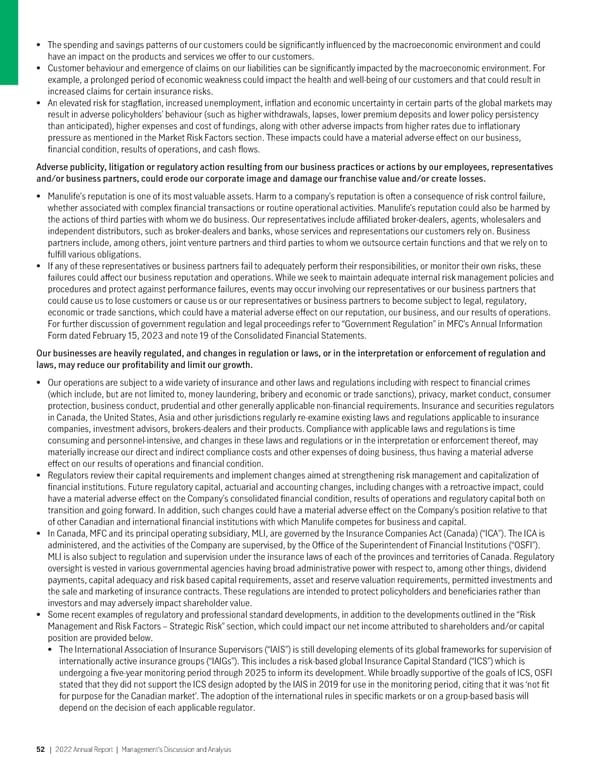• The spending and savings patterns of our customers could be significantly influenced by the macroeconomic environment and could have an impact on the products and services we offer to our customers. • Customer behaviour and emergence of claims on our liabilities can be significantly impacted by the macroeconomic environment. For example, a prolonged period of economic weakness could impact the health and well-being of our customers and that could result in increased claims for certain insurance risks. • An elevated risk for stagflation, increased unemployment, inflation and economic uncertainty in certain parts of the global markets may result in adverse policyholders’ behaviour (such as higher withdrawals, lapses, lower premium deposits and lower policy persistency than anticipated), higher expenses and cost of fundings, along with other adverse impacts from higher rates due to inflationary pressure as mentioned in the Market Risk Factors section. These impacts could have a material adverse effect on our business, financial condition, results of operations, and cash flows. Adverse publicity, litigation or regulatory action resulting from our business practices or actions by our employees, representatives and/or business partners, could erode our corporate image and damage our franchise value and/or create losses. • Manulife’s reputation is one of its most valuable assets. Harm to a company’s reputation is often a consequence of risk control failure, whether associated with complex financial transactions or routine operational activities. Manulife’s reputation could also be harmed by the actions of third parties with whom we do business. Our representatives include affiliated broker-dealers, agents, wholesalers and independent distributors, such as broker-dealers and banks, whose services and representations our customers rely on. Business partners include, among others, joint venture partners and third parties to whom we outsource certain functions and that we rely on to fulfill various obligations. • If any of these representatives or business partners fail to adequately perform their responsibilities, or monitor their own risks, these failures could affect our business reputation and operations. While we seek to maintain adequate internal risk management policies and procedures and protect against performance failures, events may occur involving our representatives or our business partners that could cause us to lose customers or cause us or our representatives or business partners to become subject to legal, regulatory, economic or trade sanctions, which could have a material adverse effect on our reputation, our business, and our results of operations. For further discussion of government regulation and legal proceedings refer to “Government Regulation” in MFC’s Annual Information Form dated February 15, 2023 and note 19 of the Consolidated Financial Statements. Our businesses are heavily regulated, and changes in regulation or laws, or in the interpretation or enforcement of regulation and laws, may reduce our profitability and limit our growth. • Our operations are subject to a wide variety of insurance and other laws and regulations including with respect to financial crimes (which include, but are not limited to, money laundering, bribery and economic or trade sanctions), privacy, market conduct, consumer protection, business conduct, prudential and other generally applicable non-financial requirements. Insurance and securities regulators in Canada, the United States, Asia and other jurisdictions regularly re-examine existing laws and regulations applicable to insurance companies, investment advisors, brokers-dealers and their products. Compliance with applicable laws and regulations is time consuming and personnel-intensive, and changes in these laws and regulations or in the interpretation or enforcement thereof, may materially increase our direct and indirect compliance costs and other expenses of doing business, thus having a material adverse effect on our results of operations and financial condition. • Regulators review their capital requirements and implement changes aimed at strengthening risk management and capitalization of financial institutions. Future regulatory capital, actuarial and accounting changes, including changes with a retroactive impact, could have a material adverse effect on the Company’s consolidated financial condition, results of operations and regulatory capital both on transition and going forward. In addition, such changes could have a material adverse effect on the Company’s position relative to that of other Canadian and international financial institutions with which Manulife competes for business and capital. • In Canada, MFC and its principal operating subsidiary, MLI, are governed by the Insurance Companies Act (Canada) (“ICA”). The ICA is administered, and the activities of the Company are supervised, by the Office of the Superintendent of Financial Institutions (“OSFI”). MLI is also subject to regulation and supervision under the insurance laws of each of the provinces and territories of Canada. Regulatory oversight is vested in various governmental agencies having broad administrative power with respect to, among other things, dividend payments, capital adequacy and risk based capital requirements, asset and reserve valuation requirements, permitted investments and the sale and marketing of insurance contracts. These regulations are intended to protect policyholders and beneficiaries rather than investors and may adversely impact shareholder value. • Some recent examples of regulatory and professional standard developments, in addition to the developments outlined in the “Risk Management and Risk Factors – Strategic Risk” section, which could impact our net income attributed to shareholders and/or capital position are provided below. • The International Association of Insurance Supervisors (“IAIS”) is still developing elements of its global frameworks for supervision of internationally active insurance groups (“IAIGs”). This includes a risk-based global Insurance Capital Standard (“ICS”) which is undergoing a five-year monitoring period through 2025 to inform its development. While broadly supportive of the goals of ICS, OSFI stated that they did not support the ICS design adopted by the IAIS in 2019 for use in the monitoring period, citing that it was ‘not fit for purpose for the Canadian market’. The adoption of the international rules in specific markets or on a group-based basis will depend on the decision of each applicable regulator. 52 | 2022AnnualReport | Management’sDiscussionandAnalysis
 2022 Annual Report Page 53 Page 55
2022 Annual Report Page 53 Page 55